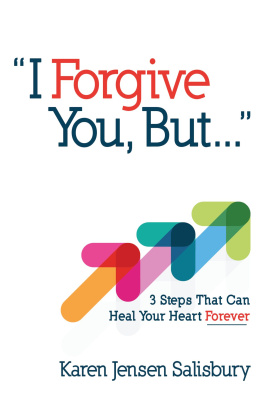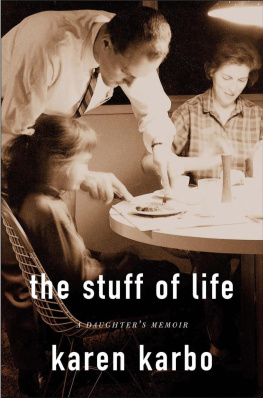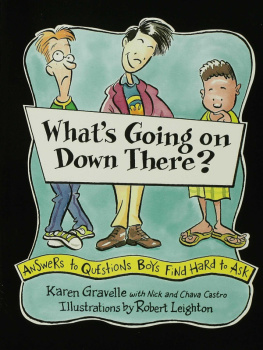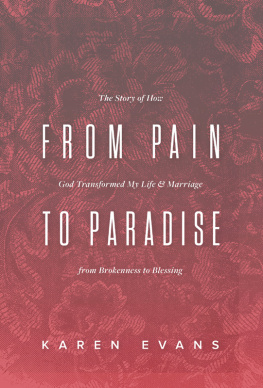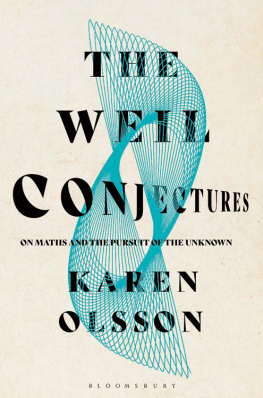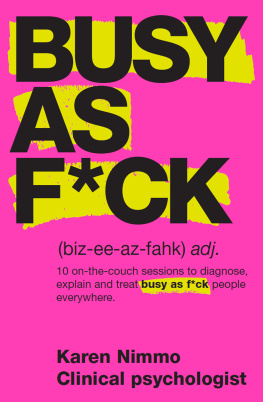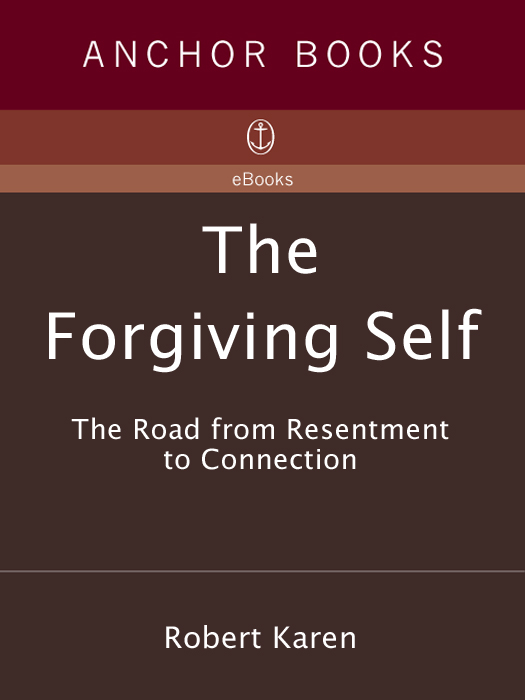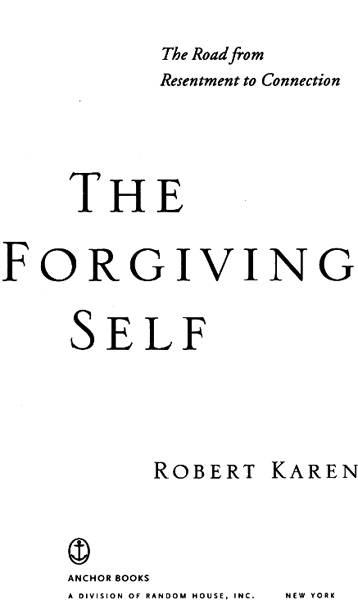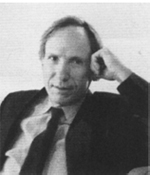 ROBERT KAREN, PH.D
ROBERT KAREN, PH.D T HE F ORGIVING S ELF
Robert Karen, Ph.D., is an award-winning author and clinical psychologist in private practice as well as an associate clinical professor at the Derner Institute of Advanced Psychology Studies at Adelphi University. The author of Becoming Attached, he lives in New York City.
ALSO BY ROBERT KAREN
Becoming Attached
When the Shooting Stops
Top Dog/Bottom Dog
For my father, Samuel Karen, 1912-1999
Like a rich jewel on an Ethiops ear.
And for my mother, Minna, and my sister, Wendy
With more to come.
C ONTENTS
PART I
ONE
TWO
THREE
FOUR
FIVE
PART II
SIX The More We Blame the Further
We Get from Ourselves
SEVEN
PART III
EIGHT
NINE
TEN
ELEVEN
TWELVE
THIRTEEN
FOURTEEN
A UTHORS N OTE
The historical events and the interviews with friends and others in this book are factual, if sometimes disguised. The patient histories, on the other hand, are mostly fictions. I was tempted to say that they had been heavily disguised, but that does not adequately describe the extent of alteration, amalgamation, transmogrification, and invention. I hope I have nonetheless done justice to the emotional truth I am trying to illustrate with them.
INTRODUCTION
P SYCHOLOGY IN F ORGIVING AND N OT F ORGIVING
I N ONE OF THE MOST FAMOUS PHOTOS TO COME OUT OF THE V IETNAM War, a small girl is running naked down the road, with an expression of unimaginable terror, her clothes burned off and her body scorched by napalm. The man who coordinated the raid on this childs village in June 1972 was a twenty-four-year-old U.S. Army helicopter pilot and operations officer named John Plummer. The day after the raid, conducted by South Vietnamese airplanes, Plummer saw the photo in the military newspaper Stars and Stripes and was devastated. Twenty-four years later Plummer told an Associated Press reporter: It just knocked me to my knees. And that was when I knew I could never talk about this. The guilt over the bombing raid had become a lonely torment. He suffered periodic nightmares that included the scene from the photo accompanied by the sounds of children screaming.
The girl in the photo, Pham Thi Kim Phuc, survived seventeen operations, eventually relocated to Toronto, and became an occasional goodwill ambassador for UNESCO. In 1996 Plummer heard that Kim would be speaking at a Veterans Day observance in Washington, not far from his home.
Kims speech included the following: If I could talk face to face with the pilot who dropped the bombs, I would tell him we cannot change history, but we should try to do good things for the present. Plummer, in the audience, wrote her a note: I am that man, and asked an officer to take it to her. At the end of the speech, he pushed through the crowd to reach her, and soon they were face-to-face. She just opened her arms to me, Plummer recounted. I fell into her arms sobbing. All I could say is, Im so sorry. Im just so sorry.
Its all right, Kim responded. I forgive. I forgive. Five months later, still connected by their peculiar history, the two were shown in an AP wirephoto, their heads touching, almost cheek to cheek, his arm around her, both smiling with an almost incongruous delight, as if he had never ordered the raid that left her body scarred and in permanent pain and he did not live with recurrent nightmares. When I called Plummer four years later, Kim had just been to visit.
The need to be forgiven is a profound factor in our lives. The story of the pilot and the girl touches us because that need lives so strongly in us, and it is rare that we see it played out in such direct and dramatic form. And yet in our everyday lives we are touched by forgiveness and haunted by its lack in a myriad of small and often unnoticed ways. Can we be forgiven our insensitivity? Our cruelties? Our betrayals? Can we be forgiven for having critically, damagingly, let someone down? Can we be forgiven the things in us that feel so terrible we dare not speak them? The feelings of others contribute to how we define ourselves to ourselves, and often it is through them, their tolerance, their perspective, their generosity, that we are able to forgive what had seemed unpardonable in us before.
One morning not long ago I was in session with a patient, a woman I had been seeing for several years, for whom revenge was such a powerful force that she had a dark view of herself and her capacity for love. During this session, I suddenly thought I had been making an error in my work with her. She was preoccupied with a superior where she worked, a married man with whom she had had a flirtation going for months but who had no interest in leaving his wife for her or even, it seemed, in having a sexual affair.
She is obsessed with talking about him, trying to figure him out, trying to enlist me in figuring him out. Weve been here before with other men. I try to derail her obsessive train of thought. Were not dealing with you, I say, with your tears, your loneliness. I tell her shes afraid of getting close to this part of her, what I call her lovelornness. This hits her and she cries. I remind her of a central feature of her childhood, the rejection she felt by her father, which had been sudden, brutal, inexplicable. She makes an irritable, disgusted sound. What are you saying by that? I ask. Youre too tough! she screams. I respond, I havent been tough enough.
After I say it, it occurs to me that this criticism of my work with herI havent been tough enoughspoken with concern but without self-recrimination, could gather into something more threatening to me. Right now I can tolerate the possibility that Ive made an error without my legitimacy as a therapist being undermined. And yet Im aware that that could change. Indeed, the change has already begun making little knock-knocks at the door.
What do you mean you havent been tough enough? she says.
Im concerned that I may have done you a disservice. Youre very stubborn and you need a strong push. She thinks about my self-criticism and seems to be wondering if its true and whether she should join in. After a moment, she pierces the silence: What difference does it make! she says with a disgusted fling of her hand, as if to say, This is irrelevant! Who cares? Why are we bothering with this! Lets get back to business! The depth of my self-indictment hits me just as I am liberated from it, freed by a forgiving wave of her hand from a bad internal place.
Forgiveness and grudge are at the heart of many human dramas. People are humiliated, jilted, stabbed in the back, robbed of their inheritance, wounded by selfishness and inconsideration, steered wrong by a trusted person. A child finds his father hanging in the closet. A parent leaves home and never returns. A grown child becomes a drug addict who remorselessly drains the family of every emotional and financial resource. The Marlon Brando character in On the Waterfront, a promising boxer, is betrayed by his crooked brother in a deal with the mob: I coulda been a contender! he cries in a celebrated scene. Two years earlier, the maker of that film, Elia Kazan, committed what many saw as an equally harrowing sellout when he testified before the House Un-American Activities Committee, naming friends and associates who had been with him in the Communist Party, thereby making himself the target of hatreds that last to this day.


